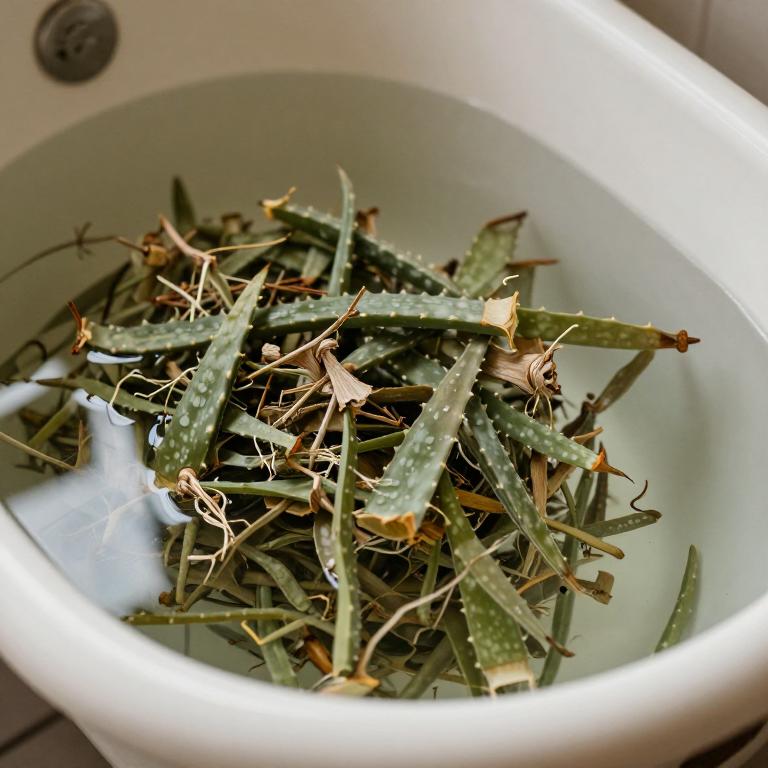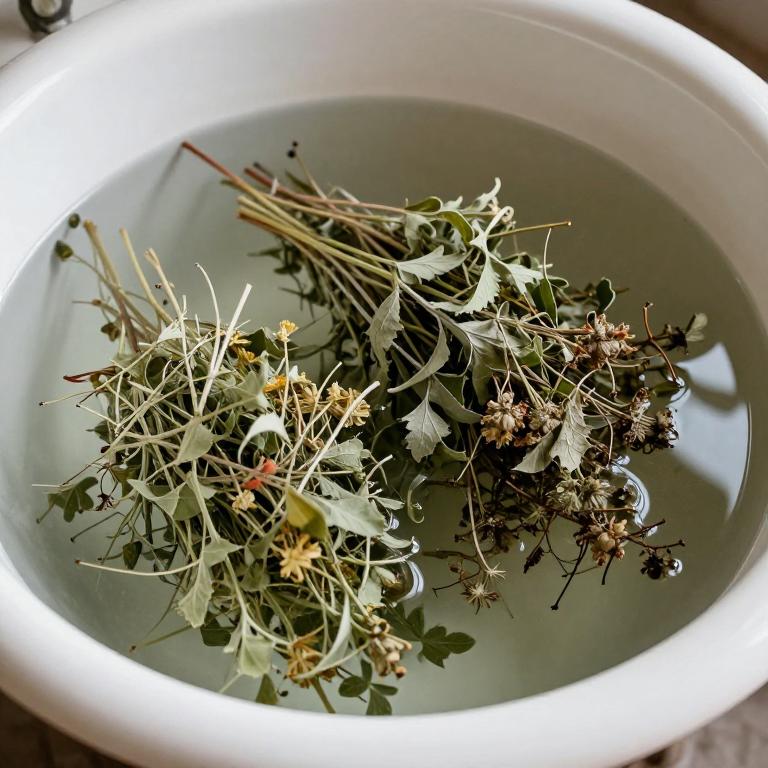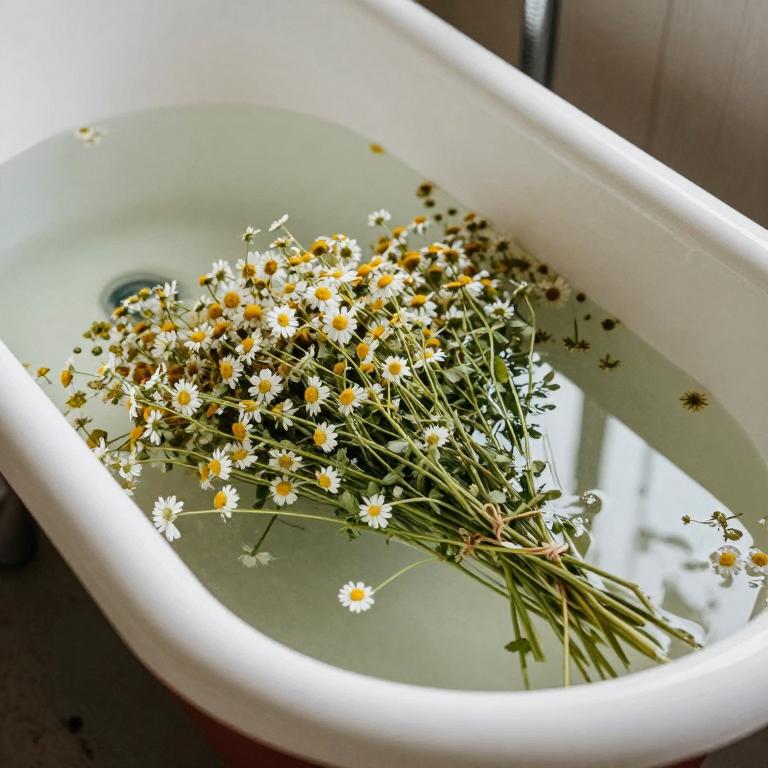10 Best Herbal Baths For Eczema

Herbal baths can be a soothing and effective complementary therapy for managing eczema symptoms.
Certain herbs such as chamomile, oatmeal, and calendula are known for their anti-inflammatory and skin-soothing properties. Adding these herbs to warm bath water can help reduce redness, itching, and dryness associated with eczema. It is important to use clean, filtered water and avoid harsh soaps to prevent further irritation.
While herbal baths may provide relief, they should not replace medical treatment and should be used under the guidance of a healthcare professional.
Table of Contents
- 1. Stinging nettle (Urtica dioica)
- 2. St. john's wort (Hypericum perforatum)
- 3. English lavender (Lavandula angustifolia)
- 4. Field horsetail (Equisetum arvense)
- 5. Aloe vera (Aloe barbadensis)
- 6. Salvia (Salvia officinalis)
- 7. German chamomile (Chamomilla recutita)
- 8. Common mallow (Symphytum officinale)
- 9. Chamomile (Matricaria chamomilla)
- 10. Dog rose (Rosa canina)
1. Stinging nettle (Urtica dioica)

Urtica dioica, commonly known as stinging nettle, has been traditionally used in herbal baths for its potential benefits in managing eczema.
The leaves of this plant contain compounds such as histamine, acetylcholine, and formic acid, which can cause a tingling sensation upon contact with the skin, but may also have anti-inflammatory and soothing effects when used in a bath. When prepared as a herbal infusion, stinging nettle can help reduce redness, itching, and irritation associated with eczema by calming the skin's inflammatory response. Some individuals find that regular nettle baths improve skin texture and reduce flare-ups, though it is important to dilute the infusion properly to avoid irritation.
As with any herbal remedy, it is advisable to consult a healthcare professional before incorporating stinging nettle baths into an eczema management routine.
2. St. john's wort (Hypericum perforatum)

Hypericum perforatum, commonly known as St. John's wort, has been traditionally used in herbal baths for its potential soothing effects on the skin, particularly for conditions like eczema.
When infused into bath water, the active compounds in Hypericum perforatum, such as hypericin and flavonoids, may help reduce inflammation and redness associated with eczema. The anti-inflammatory and antimicrobial properties of this herb can provide relief from itching and irritation, promoting a sense of comfort and healing. However, it is important to note that individuals with sensitive skin or those taking medications should consult a healthcare provider before using St. John's wort baths, as it may interact with certain drugs.
Overall, herbal baths with Hypericum perforatum offer a natural, holistic approach to managing eczema symptoms when used safely and appropriately.
3. English lavender (Lavandula angustifolia)

Lavandula angustifolia, commonly known as English lavender, has been widely used in herbal baths for its soothing and anti-inflammatory properties, which can be beneficial for individuals suffering from eczema.
The essential oils in lavender, particularly linalool and lavandins, have been shown to reduce skin irritation and promote a calming effect on the skin. When added to warm bath water, lavender can help alleviate dryness, redness, and itching associated with eczema. Many people find that regular lavender baths improve skin hydration and reduce the frequency of flare-ups.
However, it is important to use lavender in diluted form and consult a healthcare provider before incorporating it into a skincare routine, especially for those with sensitive skin or existing allergies.
4. Field horsetail (Equisetum arvense)

Equisetum arvense, commonly known as field horsetail, has been traditionally used in herbal baths to alleviate symptoms of eczema due to its high concentration of silica and other minerals.
The anti-inflammatory and astringent properties of horsetail may help reduce redness, itching, and irritation associated with eczema when used in warm water baths. These baths are believed to support skin healing by strengthening the skin's barrier function and promoting moisture retention. However, it is important to use the herb in moderation and consult a healthcare professional before incorporating it into a treatment regimen, especially for those with sensitive skin or existing allergies.
Overall, equisetum arvense herbal baths offer a natural approach to managing eczema, though they should complement, not replace, conventional medical treatments.
5. Aloe vera (Aloe barbadensis)

Aloe barbadensis, commonly known as aloe vera, has been widely recognized for its soothing and healing properties, making it a popular choice for herbal baths aimed at alleviating eczema symptoms.
When incorporated into a bath, aloe vera gel or extracts can help reduce inflammation, soothe irritated skin, and promote hydration due to its rich content of vitamins, minerals, and antioxidants. The anti-inflammatory and antimicrobial properties of aloe vera may help decrease redness, itching, and dryness associated with eczema. To use aloe barbadensis in a bath, it can be mixed with warm water or added to bath salts for a calming and therapeutic experience.
While it is generally safe for most skin types, individuals with sensitive skin should perform a patch test before using aloe vera in their baths to avoid any adverse reactions.
6. Salvia (Salvia officinalis)

Salvia officinalis, commonly known as sage, has been traditionally used in herbal baths for its soothing and anti-inflammatory properties, which can be beneficial for individuals suffering from eczema.
When infused into warm water, sage leaves release compounds such as thujone and rosmarinic acid, which may help reduce skin irritation and redness associated with eczema. These baths can also help to calm the skin and promote a sense of relaxation, which is particularly important for managing the stress that often accompanies chronic skin conditions. However, it is important to use sage cautiously, as some individuals may experience allergic reactions or skin sensitization.
As with any herbal remedy, it is advisable to consult with a healthcare professional before incorporating sage baths into a skincare routine for eczema.
7. German chamomile (Chamomilla recutita)

Chamomilla recutita, commonly known as German chamomile, has been widely used in herbal baths for its soothing and anti-inflammatory properties, making it a popular choice for individuals suffering from eczema.
When added to warm water, chamomile releases essential oils and compounds like bisabolol and chamazulene, which help reduce skin irritation and redness. These compounds possess antimicrobial and antihistamine effects, which can alleviate the symptoms of eczema by calming the skin and reducing itching. Herbal baths with chamomile can be a natural and gentle way to provide relief without the use of harsh chemicals.
However, it is important to consult with a healthcare provider before using chamomile baths, especially for those with known allergies or sensitive skin.
8. Common mallow (Symphytum officinale)

Symphytum officinale, also known as common comfrey, has been traditionally used in herbal baths for its purported skin-soothing properties.
When prepared as a bath, comfrey may help reduce inflammation and promote skin healing, potentially offering relief for eczema sufferers. However, it is important to note that comfrey contains pyrrolizidine alkaloids, which can be toxic to the liver if used improperly or for extended periods. Due to these risks, it is generally recommended to avoid using comfrey baths during pregnancy, nursing, or for individuals with liver conditions.
As with any herbal remedy, it is advisable to consult a healthcare professional before incorporating comfrey into an eczema treatment regimen.
9. Chamomile (Matricaria chamomilla)

Matricaria chamomilla, commonly known as chamomile, is a herbal remedy often used in baths to alleviate symptoms of eczema due to its anti-inflammatory and soothing properties.
When infused into warm water, chamomile creates a calming bath that can help reduce redness, itching, and irritation associated with eczema. The essential oils in chamomile, such as bisabolol, have been shown to have mild antiseptic and anti-itch effects, making it beneficial for sensitive skin. Using chamomile baths regularly can provide relief and support the skin's natural healing process.
However, it is important to perform a patch test first to ensure no allergic reaction occurs, especially for those with known sensitivities to plants in the Asteraceae family.
10. Dog rose (Rosa canina)

Rosa canina, also known as dog rose, is a traditional herbal remedy often used in baths to soothe eczema due to its anti-inflammatory and moisturizing properties.
The flowers and berries of the Rosa canina plant contain compounds like flavonoids and vitamin C, which may help reduce skin irritation and promote healing. When infused into warm water, a Rosa canina herbal bath can provide a calming effect on the skin, easing redness and itching associated with eczema. This natural treatment is considered gentle and safe for most skin types, making it a popular alternative to conventional remedies.
However, it is advisable to consult a healthcare provider before using herbal baths, especially for severe or persistent eczema cases.